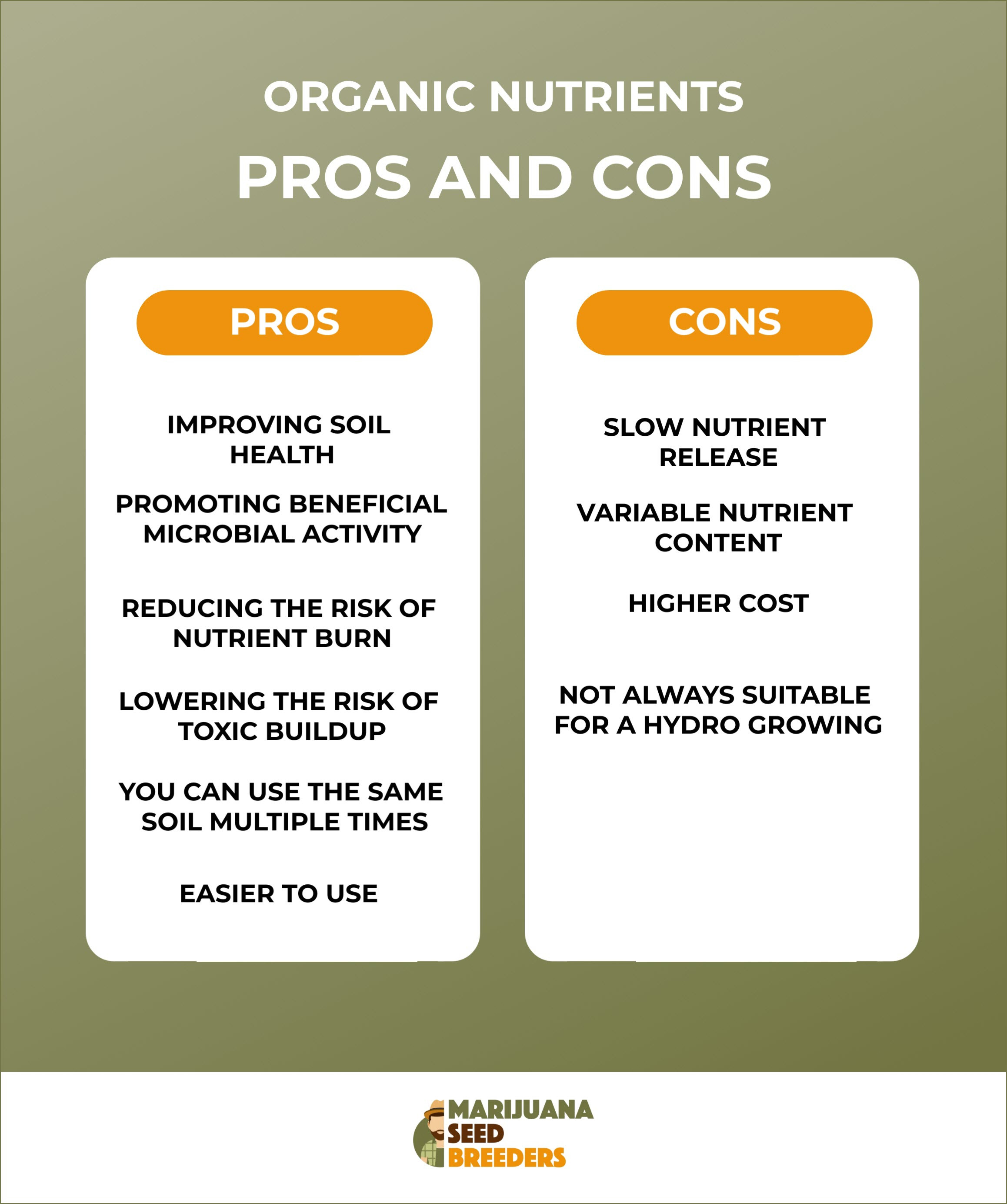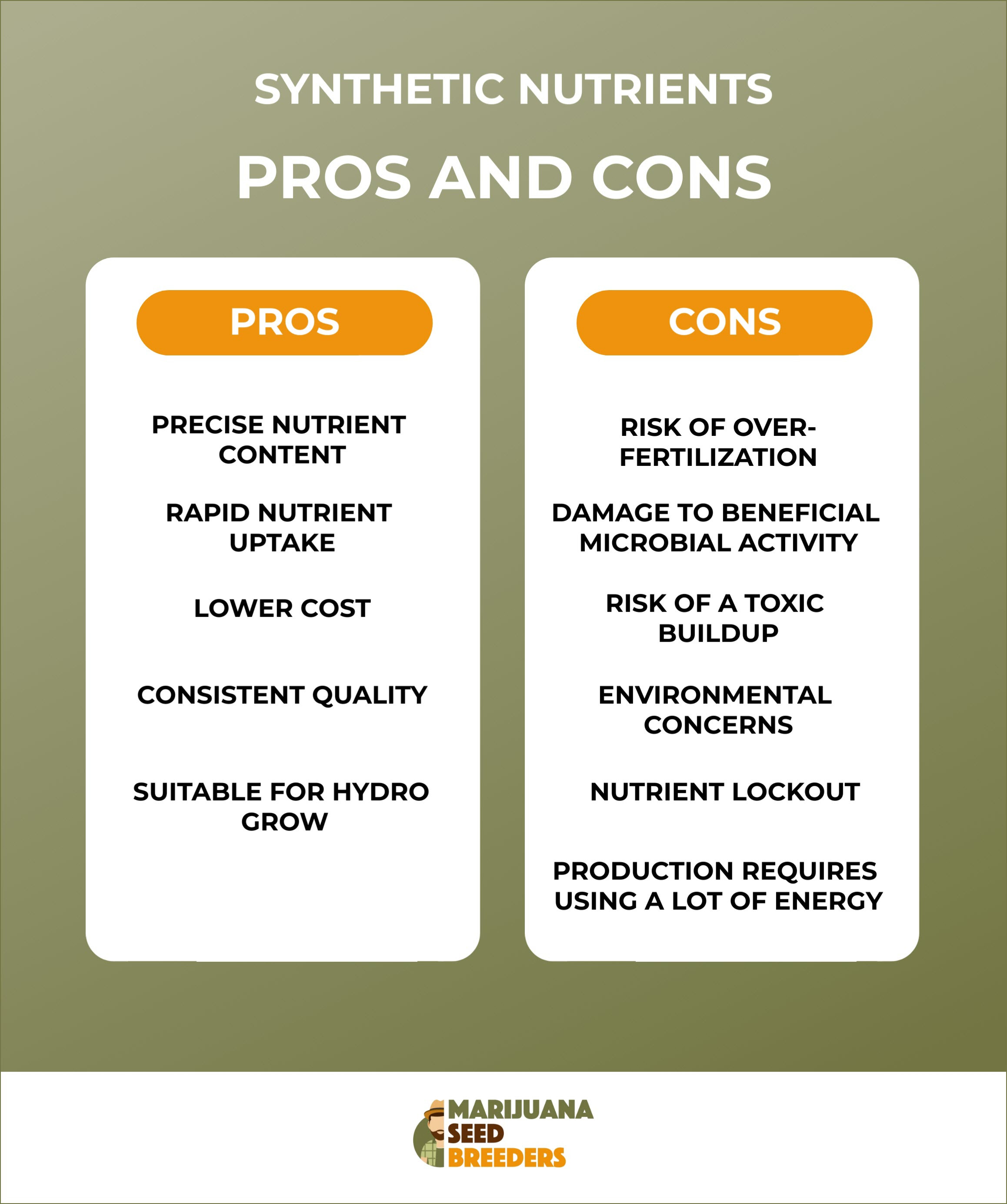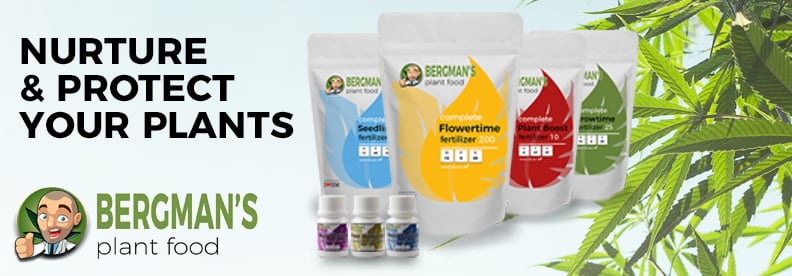When to Choose Organic vs Synthetic Nutrients for Cannabis?

The question of whether to use Organic vs Synthetic Nutrients (fertilizers) can be a tricky one.
As both options come with their own pros and cons.
Fortunately, you don't need to look far to figure out which one to choose.
This article compares two types of nutrients for cannabis plants and helps you choose the best one.
So, let's dive in and get growing!
When to Choose Organic vs Synthetic Nutrients for Cannabis?
Use organic cannabis nutrients if you want to grow cannabis using natural methods. Organic nutrients will also help you improve soil health, enhance flavor and aroma, and promote a more sustainable approach to growing.
Use synthetic nutrients if you want a cheaper solution or if you decide to grow hydroponically. Synthetic nutrients are often the preferred choice for hydroponic growing, as they are easier to absorb by the plants. It is also easier for growers to tailor the nutrients to the specific needs of plants grown in hydroponic systems.
Ultimately, the decision to use organic or synthetic fertilizers for cannabis will depend on your growing methods, goals, and personal preferences.
Definition and differences between organic and synthetic nutrients
Feeding your plants with nutrients is essential to the growth and overall health of any cannabis plant. There are several types of fertilizers available that you can use, with organic and synthetic being the two most common types.
Organic nutrients
Organic nutrients are typically made from natural sources, such as compost, bone meal, or fish emulsion. They can provide long-lasting benefits to both the plants and the soil they grow in.
While they are often more expensive than synthetic nutrients, they are less likely to cause harm to the environment. This makes them a popular choice among growers who prioritize sustainable growing practices and like to use the natural approach towards their lives.
Synthetic nutrients
Synthetic nutrients are chemically formulated in a lab and are often cheaper than their organic counterparts. However, synthetic fertilizers can negatively impact natural diversity of the soil and potentially harm environmental impact.
This is especially the case when they are misused or used excessively. Yet, even when used properly, the chemical solutions can cause water pollution, harm surrounding ecosystems, and decrease the overall quality of your soil.
Soil degradation is also a result of high amounts of salt you find in synthetic fertilizers. To illustrate how bad it is - have you ever seen what salt can do to a snail?
Unfortunately, the same can happen to many beneficial organisms living in your soil due to the high salt content.
Pros and cons of organic nutrients
Organic nutrients are a popular choice among cannabis growers who want to grow sustainability and care about the long-term health of their soil. What are other pros and what are the cons of choosing the organic route?

Pros of using organic nutrients
Improving soil health
Organic nutrients help build a strong and diverse ecosystem, resulting in healthy soil. And healthy soil means healthy plants.
Promoting beneficial microbial activity
Organic nutrients support the growth of beneficial microorganisms in the soil. These microorganisms are responsible for breaking down organic matter and for improving the health of the soil all together.
Reducing the risk of nutrient burn
Nutrient burn is when cannabis plants are damaged by being exposed to too many nutrients. Since organic nutrients have a slower release time than synthetic nutrients, the chance of them causing nutrient burn is much lower.
Lowering the risk of toxic buildup
Organic nutrients are also way less likely to accumulate in the soil and cause long-term harm to the plants and surrounding environment.
You can use the same soil multiple times
By reusing soil for multiple grows, you are reducing your overall waste and lowering your costs, helping your grow operation be more sustainable and cost-effective.
Reusing the same soil has another benefit - it will be easier for your plant's roots to grow in soil where another plant has grown. This is because roots from the new plants will find the channels made by their predecessors and grow into them instead of creating new spaces. As a result, your plant can save some energy and use it on other critical growing processes.
Easier to use
Organic fertilizers are very easy to master, making them a popular choice among both novice and experienced growers. You can even buy grow kits which contain organic fertilizers making this already simple process even easier.
Cons of using organic nutrients
Slow nutrient release (unsuitable in case of a sudden nutritional deficiency)
Organic fertilizers release nutrients more slowly than their synthetic counterparts. While this is great for healthy plants, it can be problematic if you are dealing with a sudden nutrient deficiency.
The best way to avoid nutrient deficiency when using organic fertilizers is to start using them right away. If you wait to use them until you see the first signs of your plants' undernourishment, you are likely too late.
Variable nutrient content
The nutrient content in organic matter can vary greatly, making it harder to be precise with the application. Fortunately, you do not need to guess how much to use and hope for the best. Instead, all organic fertilizers come with detailed and clear instructions that, if you follow them strictly, will help you achieve the best results.
And remember that using amounts bigger than recommended by the producer is never a good idea!
Higher cost
Organic fertilizers are often more expensive than synthetic fertilizers, making them less budget-friendly.
Not always suitable for a hydro growing
Some organic nutrients are not suitable for hydroponic growing. Therefore, it is essential to do your homework if you do decide to incorporate an organic fertilizer into a hydroponic setup.


From Bob (the Breeder)
'I prefer to grow in soil because it feels like the most natural approach.
It is especially the case if you incorporate mycorrhizal fungi and bacteria.
They help the soil retain water and nutrients until the plants need them the most.
Organic nutrients also allow me to care for both the plant's and soil's wellbeing. And they are also easier to use, which is a great bonus!
Happy Growing'
Pros and cons of synthetic nutrients
Synthetic nutrients are a popular choice among cannabis growers who look for cost-efficient solutions. They also allow for growers to be extremely precise with the number of specific nutrients used to feed their plants. But what are the other potential benefits of using synthetic nutrients? And are there any disadvantages you need to consider?

Pros of using synthetic nutrients
Precise nutrient content
Synthetic fertilizers have a carefully calculated and consistent nutrient content, which can help provide accuracy when feeding plants. The more accurate and specific you are with your measurements, the less likely you are to cause a nutrient burn or deficiency.
Rapid nutrient uptake
It is easier for cannabis to absorb synthetic nutrients compared to organic ones, which can lead to quick results when coping with nutrient deficiency.
Lower cost
Synthetic fertilizers are often cheaper than organic fertilizers as you need less of them to feed your plants (compared to organic).
Consistent quality
Synthetic nutrients are produced in laboratories under highly controlled conditions and are more consistent in content and quality.
Suitable for a hydro grow
Synthetic nutrients are more suited for a hydroponic setup, as they are more gentle on the expensive equipment needed for hydroponic grows.
Cons of using synthetic nutrients
Risk of over-fertilization
It is much easier to cause over-fertilization when using synthetic nutrients, as it is easy for plants to absorb too much of it at the beginning of their life. As a result, the plants don’t grow at their natural speed and might be harder to manage. Additionally, they might end up producing buds that contain the fertilizers, which has a negative impact on the flavors.
Damage to beneficial microbial activity
Synthetic nutrients can damage microorganisms that live in the soil. These organisms are very beneficial for cannabis plants, so you want to make sure they are well and healthy.
Risk of a toxic buildup
When synthetic nutrients accumulate in the soil, they cause a toxic buildup, which ends up causing harm to both the plants and the soil.
Environmental concerns
Using synthetic fertilizers can lead to pollution and other environmental issues. So if you're all about sustainability and saving the environment, then synthetic fertilizers are not for you.
Nutrient lockout
When used in excess, synthetic nutrients can cause a nutrient lockout, which is the inability of cannabis plants to absorb the essential nutrients needed for plant growth.
Their production requires using a lot of energy
Unfortunately, synthetic nutrients require a lot of energy to produce. As a result, this process is very harmful to the environment.
At MSB, taking care of the environment is one of our top priorities. Therefore, moving away from synthetic to organic fertilizers was a no-brainer for us.
Choosing the right nutrient source
When you're deciding between organic and synthetic nutrients for your cannabis grow, think about your growing conditions as well as your priorities. This will make it much easier to make a choice you will be happy with for a long time.
Considering environmental factors
One of the first things you should consider is the space you will use for your grow. For example, organic nutrients are excellent for people growing cannabis outdoors.
They are much less likely to harm the environment and are crucial for keeping the soil healthy and full of beneficial microbes for future grows.
For indoor grows, you need to be more precise in your use of nutrient, as it's important to replicate (as best you can) the outdoor environment. Synthetic nutrients can provide more control and accurate feeding but are also harder to use.
Additionally, if you're growing in soil, synthetic nutrients are the wrong choice if you want to reuse the same soil in the future.
However, using synthetic nutrients make sense when you go for a hydroponic setup, as they are easier to dissolve and provide targeted feeding.
Balancing nutrient needs with cost and other factors
You should also consider the content of your wallet. Organic fertilizers can be more expensive, but you should consider them an investment. They provide long-term benefits to the soil and are an eco-friendly choice.
Synthetic nutrients are more affordable and provide quick results, but you might pay the price later if you plan on growing for years to come.
Ultimately, the decision to use organic or synthetic nutrients is personal and depends on your and your plants’ needs. Also consider your budget and how important sustainability is to you.
Still not sure what to choose? Reach out to us and ask for our advice.
Supplemental nutrients and additives
Just like people, plants sometimes need some extra supplements. While we may need an extra magnesium or vitamin C pill every now and then, plants may sometimes need supplemental nutrients and additives.
For example, you can supplement your regular feeding regimen with bloom boosters, root stimulators, and foliar sprays if you think your plants will enjoy it. These different types of supplements can really help your cannabis plants stay healthy and produce amazing buds.
But what should you use and when?
Bloom boosters
For the flowering stage, consider giving your plants some bloom boosters (also known as bloom fertilizers). Their purpose is to help increase the size of your buds and improve the overall quality of the harvest.
What differentiates bloom boosters from other products is that they typically contain high levels of phosphorus and potassium essential for healthy flower development.
When it comes to bloom boosters, investing in organic bloom fertilizers is a wise choice, as you want to ensure you do not create a nutrient lockout in such a crucial and delicate phase of cannabis growth cycle.
Fun fact - adding mycorrhiza to your soil will provide the same results as adding bloom boosters!
Root stimulators
If you want to make it easier for your plants to absorb and uptake the nutrients you're feeding them, consider using root stimulators. Their goal is to increase the number and size of root hairs, making it easier for your plants to absorb various nutrients.
Root stimulators usually contain a carefully designed mix of vitamins, amino acids, and hormones.
Rhizobacteria will give you the same results as root stimulators. In addition, they will protect young roots and convert vegetable residuals into amino acids and grow hormones.
Foliar sprays
When dealing with the roots, you can also give extra attention to the leaves of your plants with foliar sprays. These supplemental nutrients are applied directly to the leaves and can be used to correct nutrient deficiencies or prevent nutrient imbalances. They usually contain a range of micronutrients, such as iron, manganese, and zinc.
It's important to note that while supplemental nutrients and additives can be helpful, you should use them sparingly. They only work when used in moderation and as an addition to a balanced feeding regimen.
You might have to deal with nutrient burn, toxicity, or other adverse effects if you overuse these products. Ensure that you always carefully follow the instructions attached by the producer, and keep a close eye on your plants to monitor how they react.
Stan
The effectiveness of THC Oil reintroduced me to the world marijuana. It’s amazing how this plant allows you to take the matters into your own hands. Growing this powerful plant at home truly gives me a self-supporting feeling. I even developed a green thumb.






